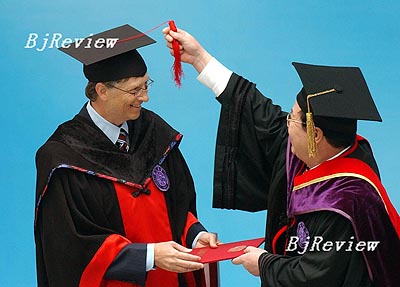
While proud of its double-digit growth and preparations for the 2008 Olympic Games, China feels lacking in one area that is regarded as being of enormous importance within the country-education.
A huge amount of emphasis is placed on education in China, yet the country's universities rank poorly when compared to the world's best.
In May 1998, the then Chinese President Jiang Zemin congratulated Peking University, one of China's oldest universities, on its 100 year anniversary, saying, "In order to realize its modernization drive, China must have a handful of internationally renowned universities."
After Jiang's speech, several prestigious Chinese universities put forward the ambitious goal of becoming top-ranking world universities. For example, Tsinghua University, China's MIT, announced a plan to join the list of top universities by 2011, the establishment's 100th birthday.
Wang Dazhong, former President of Tsinghua who first formulated the goal, said, "Building top-ranking universities will not only drive China's higher education as a whole to a higher level, but will also have strategic significance for boosting China's comprehensive national strength and international competitiveness and promoting sustainable economic and social development."
Yang Fujia, former President of Shanghai-based Fudan University and Chancellor of the University of Nottingham in Britain, said since the late 1990s Chinese universities have progressed at such a rate that joining the ranks of the world's best is no longer just a dream.
Yet Yang also admitted that Chinese universities, without exception, are not in the same league as world top-ranking universities in terms of academic and technological research, although the education level of some of them reaches the standard of the globe's best, and has played an important role in promoting China's social development.
Yang added that China's high school graduates every year provide a huge talent pool, which makes the necessity for building first-rate universities and higher education institutions more urgent. "Excellent universities are like melting pots, which will produce excellent refined steel out of good iron. China doesn't lack good iron, but needs good melting pots," Yang said.
Disheartening reality
In April 2007, the Research Center for Chinese Science Evaluation of Wuhan University released its rankings of the world's most competitive universities. Peking University was ranked 192nd and Tsinghua University was 196th, despite the rankings of the two best universities in China having risen by 61 and 68 places respectively compared with last year's list from the same institution. In an earlier Newsweek ranking, no Chinese university appeared among the top 100.
The results were disappointing. "I have always believed that building a top university in China would be more difficult than building an internationally successful business or a world renowned research institution. Most barriers are external rather than internal," said Ling Zhijun, a senior editor at People's Daily, the flagship newspaper of the Communist Party of China Central Committee.
Yang Dongping, a professor at Beijing Institute of Technology (BIT) specializing in studying China's higher education system, said, "Chinese universities still lag far behind the world's top universities if evaluated on their efforts to establish modern education systems."
Where are the gaps?
Amid the fervor to build world-class universities in China, many universities are borrowing huge amounts of money to expand their campuses and build new facilities, which has left some on the verge of bankruptcy. To cope with the financial strain, some universities have raised their tuition fees and significantly enlarged their annual enrollment, which has triggered concern about a potential decline in the quality of the education they can provide.
Meanwhile, many universities have started to build their academic and research prestige by pushing their teaching staff to yield more papers as research products. Some universities have even linked teaching staff benefits and bonuses with the number of papers they published. This pragmatic approach has created a fake prosperity in China's academic arena where the newly launched inventions and discoveries of scientific research actually show little innovation and rarely have any international influence.
"China's expansion of college enrollment in recent years has enabled one out of every five middle school graduates to receive higher education. This means Chinese higher education has achieved an expansion in a couple of years, which has taken most developing countries dozens of years or even hundreds. However, the speedy expansion and businesslike trend have made some universities no longer real universities," said Professor Ding Xueliang of Hong Kong University of Science and Technology.
| 